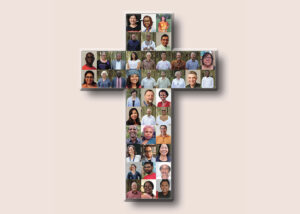Perhaps you remember the 2000 box office hit My Big Fat Greek Wedding. It tells the story of a young Greek American woman, Toula Portokalos, falling in love with a non-Greek WASP, Ian Miller. Her family struggles to accept him while she struggles to come to terms with her cultural identity.
Acclaimed as a romantic comedy spiced with a celebration of ethnicity, this movie goes beyond romance. Toula’s Greek father Gus’s dialogue comically represents the exaltation of the Greek culture and the inevitable, accompanying ethnocentric point of view: “Now, gimme a word, any word, and I’ll show you how the root of that word is Greek.”
In Gus’s perspective, there are two kinds of people in the world: Greeks and those who wish they were Greek.
The greatest barrier to becoming an intercultural church does not lie in any external elements—buildings, capital, etc.—but in our own internal, ethnocentric tendencies. This ethnocentrism puts one’s own group or nation (from the Greek ethnos), its assumptions and judgments, in the centre (kentron) of everything. It also develops into a rigid belief that some or all aspects of its culture are superior, leading to the division of the whole into us and them.
For example, ancient Greeks tended to perceive other groups as barbarians (which means babbler), the Chinese called their country the “Middle/Centre Kingdom” (中華), and the Jewish belief system includes the notion of “the chosen people.”
No one is free from ethnocentric tendencies unless we live in a cultural vacuum. Ethnocentrism is not a modern creation but an ancient phenomenon. The word itself was coined by the Polish sociologist Ludwig Gumplowicz in 1879, but in Christianity, its origin goes back to Genesis, when Adam and Eve were kicked out of Eden because of their self-centeredness.
What Adam and Eve did to survive in the unknown post-Eden world was to put themselves in the centre of the world, superiorizing themselves and disfavouring other alien cultures. That’s the history of Israelites in the Old Testament, which finally brought God’s condemnation. The ancient Israelites did not know their self-centred perspectives were limited and parochial, giving birth to false assumptions about other nations, buying into ethnic superiority, arrogance and hostility, and finally forgetting that the Gentiles are fellow heirs (Ephesians 3:6).
So, we, as modern-day ethnocentrists in the name of Mennonites, seem indelibly indebted to these early human ancestors, even though we are generally not aware that we are ethnocentric. Even in my intercultural Mennonite church context, when African members use the Djembe on the upbeat, and shout amen and halleluiah, this was often met with displeasure from white members who regarded it as unacceptable in worship.
We are bombarded by societal forms of bias, prejudice, stereotyping and discrimination. Is this world any more dignified than ancient eras?
The church, which should be a refuge from these unfortunate anti-gospel phenomena, is no safer than any other part of society. It is often a hotbed for superiorism, nationalism and discrimination, in the name of protecting its purity and fidelity to God. We should ask ourselves: to what extent is the Mennonite church ethnocentric, insular and self-serving, using this as a shield while cherishing our cultural identity?
In the united, intercultural body of Christ, there is no place for ethnocentrism. Remember how the gospel of Jesus crossed the cultural boundaries and ministered to the Gentiles. Jesus retells the story of the widow of Zarephath in Elijah’s time and the healing of Naaman the Syrian, the healing of a Gentile (Samaritan) in the group of ten lepers, the healing of the Syrophoenician’s daughter, the healing of the Roman centurion’s servant, the story of the Good Samaritan. I name just a few.
Ethnocentrism is not compatible or reconcilable with the teaching of Jesus. There is no middle ground. Ethnocentrism is a thing to be crushed by the power of the Gospel message, a truth that is universal and always applicable. We cannot be ethnocentric and a follower of Jesus at the same time. Jesus on the cross ended human ethnocentrism. Why do we so often sing “Jesus, Be the Center” (Voices Together, #584, by Michael Frye) in Sunday worship? Because truly, the one and only centredness we need is not in us but only Jesus Christ our Lord. “Jesus be the center, be my source, be my light, Jesus….” Let’s sing out loud. We are now all equally safe.
Joon Park serves as intentional interim co-pastor at Holyrood Mennonite Church in Edmonton.







Leave a Reply
You must be logged in to post a comment.